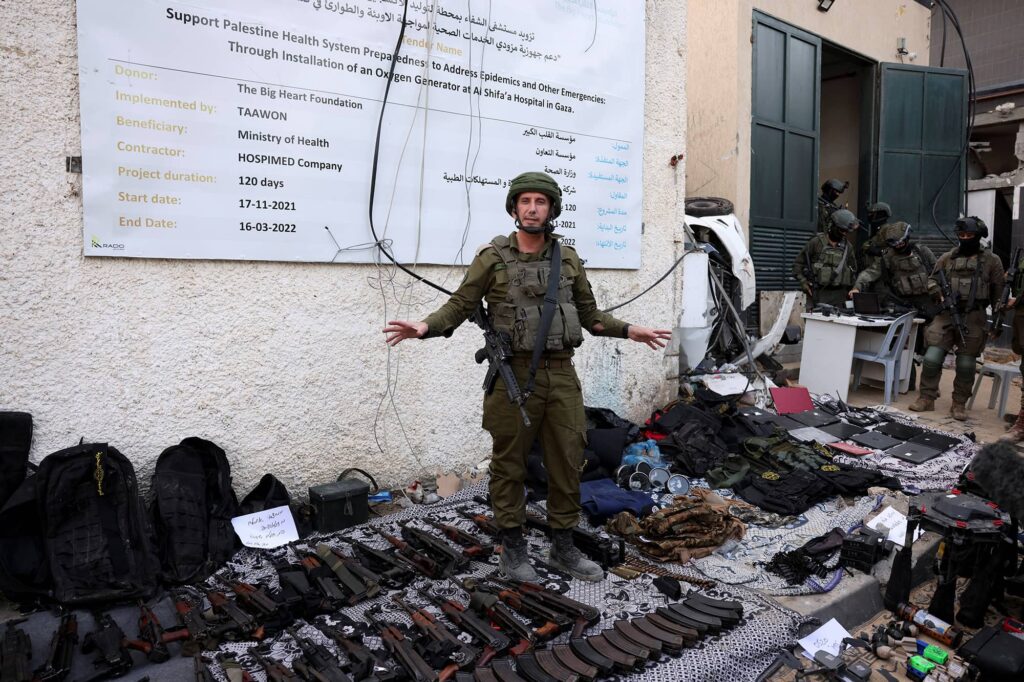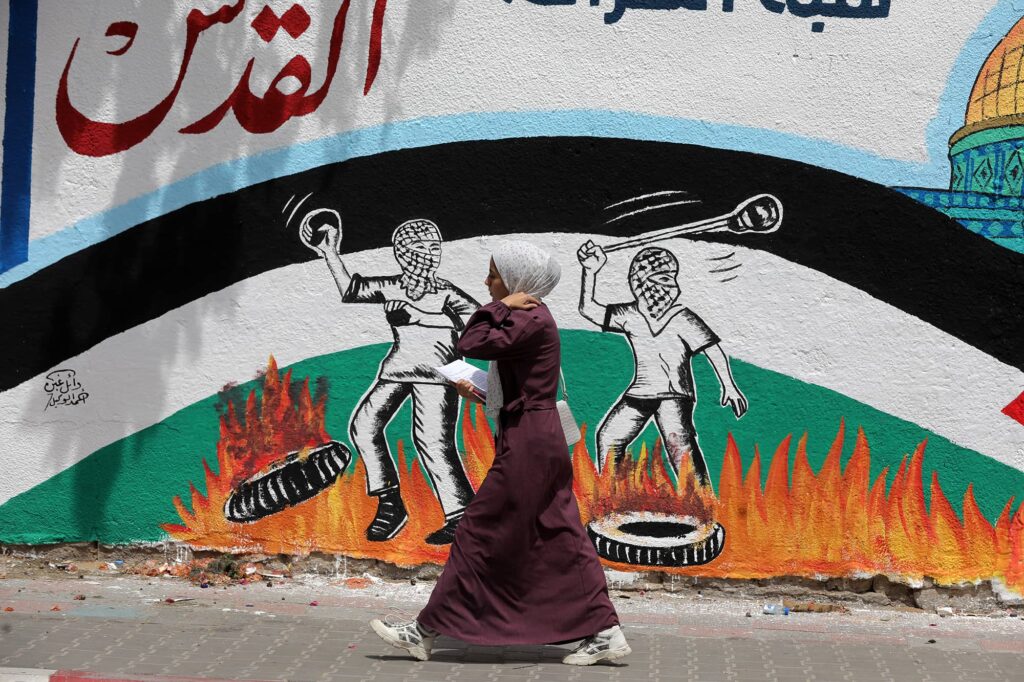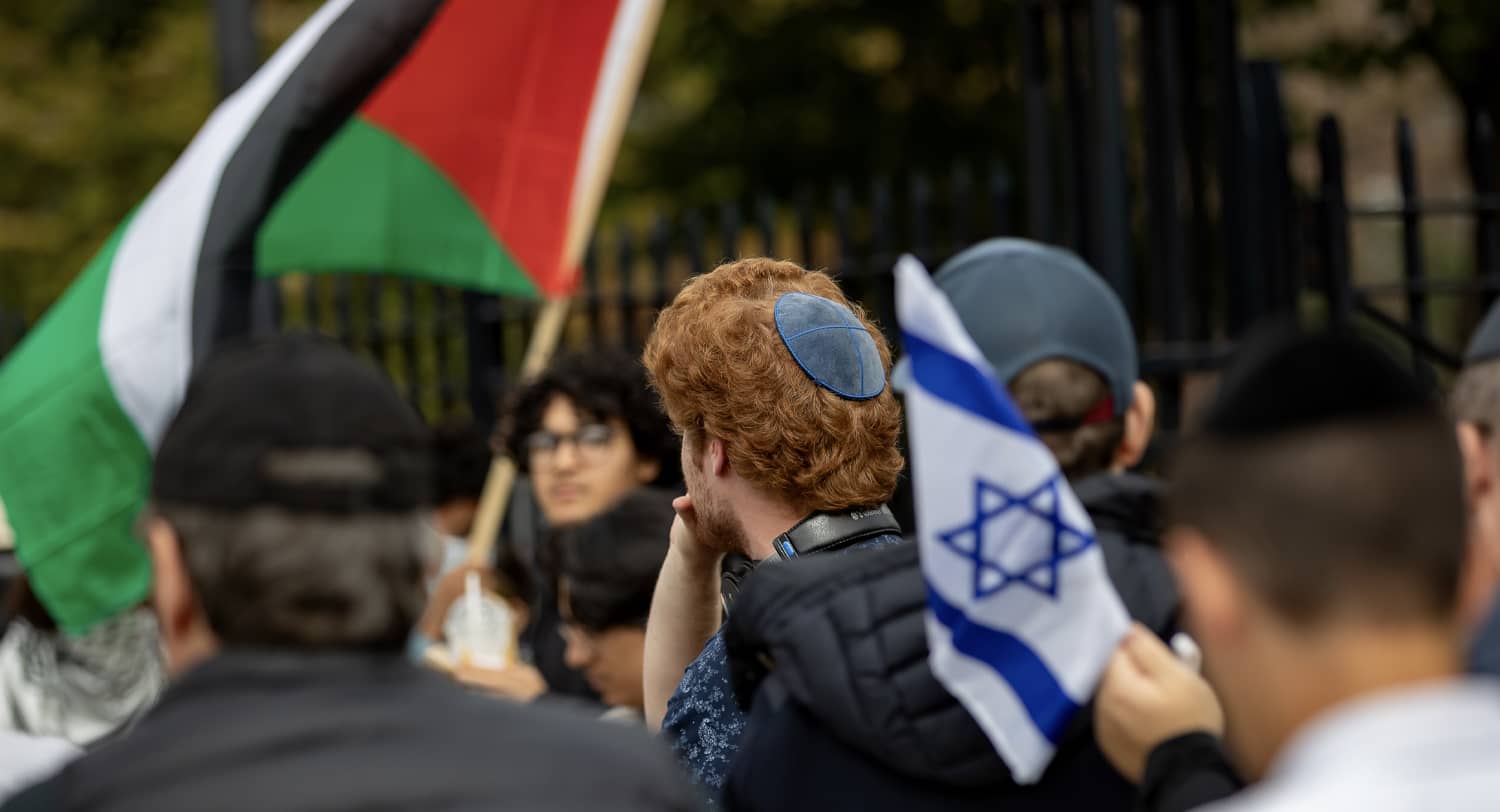One of the most striking characteristics of the war in Gaza is a severe deficit of empathy. Israelis and Palestinians indicate that they have no emotion left for the other side. The stress would be too unbearable. In addition, each side tends to dehumanize the other, deny the other’s suffering and promise vengeance and violence to come. Both are convinced that the other side is “faking it.”
Why is it happening? How does the lack of empathy contribute to the continuation of violence and the difficulty of reaching a “day after”?
For Israelis, Gaza is a War Zone but not a Scene of Humanitarian Crisis
Coverage of the war in Gaza has completely taken over Israel’s airwaves and internet: coverage starts early in the morning and ends late at night. Even reality TV shows and comedy touch on the war.
The content is intense. Survivors of the October 7 massacre tell their stories, relatives of the hostages call for their release. Mothers and fathers of the fallen soldiers talk about their children that paid the price of the war. Israeli military correspondents embedded with the troops uncover Hamas military tunnels, reveal weapons within hospitals and homes, and discover traces of hostages’ presence. They only briefly show viewers the massive destruction of what were once homes, hotels, office buildings and markets.
The message is simple – the enemy that was hiding here is being crushed by the IDF. Israeli correspondents who cover Palestinian and Arab affairs carefully analyze every statement made by Hamas leaders in Gaza and abroad. Israelis are familiar with their names and follow their messages.
At the same time, coverage of civilians in Gaza and the raging humanitarian crisis in the Strip is scarce. Israeli viewers may see some vox-pop of Palestinian civilians who object to Hamas and blame the Islamist group for their tragedy, and hear about the daily volume of humanitarian aid that enters Gaza. But the human stories that fill the broadcast channels and the internet in the West and in the Arab world are almost non-existent on Israeli TV. Discussions of the humanitarian crisis in Gaza focus on the information war: The world falsely accuses Israel of horrible crimes, while Israel tries to present its own narrative to prove that the other side is lying.
Even the negative incidents for which the IDF claims responsibility – such as the shelling of World Central Kitchen staff – rarely include any emotional element. Reporters and the analysts dispassionately discuss the trajectory of shelling, the positions of destroyed vehicles and the reactions to the incident in the US and the Arab world. Israeli politicians have set this tone: Israelis must save their empathy for Israelis who were killed, maimed, kidnapped or evacuated from their houses owing to the massacre of October 7, while there can be no mercy for the other on the grounds that they “celebrated the 07/10” , although it is quite impossible to know what those Gazans who were killed felt about Hamas’ attack.
Rare expressions of mourning for “the other” are often met with anger in Israel. A pro-settler Channel 7 website had expressed outrage when left-wing activists opened a mourning tent to express solidarity with the suffering of Gazans. A headmaster who wrote in her Facebook that Israeli media is not showing the real situation on the ground in Gaza was criticized by angry parents while the students declared a strike.

For Palestinians, “No Israeli Civilians were Killed on October 7”
While Israelis consume mostly their own national news through television, newspapers, websites, or influencers online, Palestinians get their news from both local and foreign sources. One of the most popular media outlets is Qatar-based Al Jazeera. Its TV channel in Arabic, the website and multiple social media channels have an audience of many millions in the Arab world, and according to polls it is the most watched media outlet among Palestinians.
Al Jazeera focuses on Palestinian suffering: the dead, the bereaved, the wounded, the kids who cry in desperation after being wounded or lose their whole families. The reports are just as emotional as Israeli reports about Israeli victims, while the reporting of Israel and Israeli society is minimal. Al Jazeera also frames “the other” through the lens of information war: its documentary about October 7 focused on “debunking many of the most horrific Israeli stories about the Palestinian military assault.” Another documentary produced by Al Jazeera referred to Hamas crimes as “human rights abuses committed by Hamas fighters” and the film focused on “debunking” what really happened.
In its English pages, Maryam Barghouti, who also publicly celebrated october 7 on her X account published an op-ed by the name “On October 7, Gaza broke out of prison.” The story didn’t include any mention of the atrocities that were executed by Hamas terrorists as well as ordinary civilians who joined them on October 7.
Online, Palestinian activists who support peace and acknowledge Israeli pain and loss, such as Ahmed Fouad Alkhatib, face constant threats and slurs, including accusations that they wor for Israel or the US. For others, the horrific story of October 7 is no more than a hoax, a lie that was invented by the Israelis as a pretext to invade Gaza, despite an abundance of Hamas-produced evidence of murders and kidnappings of wounded elderly, women and children to Gaza.
A March survey of public opinion conducted by the Palestinian Center for Policy and Survey Research indicated that only one in five Palestinians has seen videos showing atrocities committed by Hamas. Only one fifth of those who did not see the videos had access, but decided not to see them; the rest report that the media they watched did not show these videos. The findings also show that those who have seen the videos are almost 10 times more likely to think that Hamas men committed atrocities on October 7.

Empathy is Taboo
Lack of empathy towards the enemy is a familiar phenomenon in the history of conflicts. I interviewed Israeli psychologist Ella Berchansky, who has volunteered with both Israeli victims of October 7 and with the victims of the Russian war in Ukraine, and who describes a distinct psychological mechanism at work. “When something as traumatic and out of the ordinary as October 7 happens, it seems so monstrous, and there is a common feeling of enormous threat. Captivity and murder are a huge threat. What happens to a person in such a situation is that self-care is strongly activated, from the point of view of survival. We are threatened and we must survive, so empathy is aimed at saving ourselves, which is a natural human response to threat. When threatened, you mostly look at who your loved ones are and there is no empathy left for strangers, who are outside of one’s family, community and people,” she explains.
In contrast, Israel does have a long record of providing aid for the other and expressing empathy – but when not personally threatened. During the Syrian civil war, Israeli civilians donated warm clothes, baby food and blankets for Syrian refugees; in 2017 the Israeli government officially offered aid for Iranian victims of an earthquake in Iran (it was rejected). One can argue that the government does it to promote itself and the country’s image yet thousands of Israeli citizens who participated in relief efforts for Syrian refugees were driven by altruism and empathy.
The story between Palestinians and Israelis is fundamentally different. Many Israelis feel that while the Iranian regime is hostile, many Iranians support Israel and the US; and while Bashar Assad is an enemy of Israel, he is also an enemy of Syrian refugees. The conflict between Israel and Palestinians is perceived as conflict between two collectives, not only between their respective leaderships. Hence statements like “they chose Hamas” or “they chose the extreme right” and the deep-running lack of trust.
Professor Muhammad Dajani, who led groups of Palestinian students to Auschwitz, points to the long-term damages of the lack of empathy. “When one is void of empathy, it is difficult to understand how hostile and even evil one looks from the other side. When the Arabs used to deny the existence of Israel and would refer to it as the ‘Zionist entity,’ crossing its name from their maps and refusing to use its name in their political discourse, these actions widened the gap for reconciliation and peace between both enemies. Similarly, denial that Palestine exists amounts to denying that the Palestinian people exist, similarly hurtful to Palestinians themselves. But both peoples do exist and are full of life and humanity. Neither are phantoms or ghosts but human beings, with similar hopes and dreams for themselves and their nations.”
At the same time, there are some extraordinary personalities. Maoz Inon, whose parents were killed by a rocket fired from Gaza into their home in Kibbutz Nativ ha-Asara, and Ahmed Fouad al-Khatib, who lost dozens of family members in the current war in Gaza, show that even despite the extreme, excruciating pain, it is still possible to feel compassion towards “the other.. Both call for peace and reconciliation and focus today on staying compassionate human beings, rather than calling for revenge.
The majority on both sides still struggle to recognize the pain and the suffering of “the other” with some Israelis fuming over innocent photos of Gazans bathing in the sea of Deir al-Balah for “living the good life”or Palestinians denying the massacres of October 7. Clearly, the media coverage from both sides is exacerbating this very human response.
The current shortage of empathy is not accidental. It derives both from the monstrosities of October 7 and in their aftermath, and from years of systematic dehumanization of the other. Those who speak about “the day after” and of plans for reconciliation for Israelis and Palestinians, should also focus on this aspect of relations, including the role of the media, and not only on borders, security and economic arrangements.

